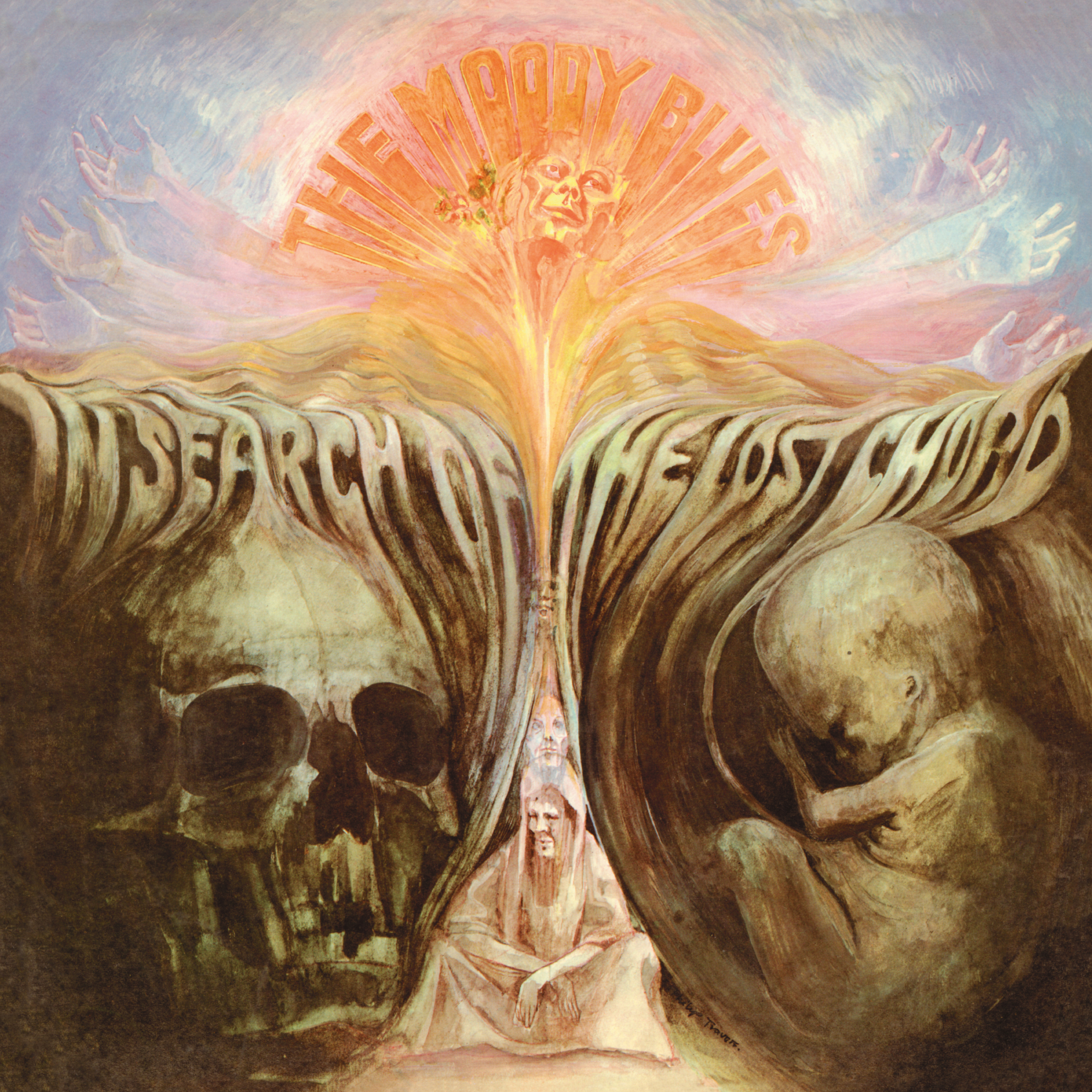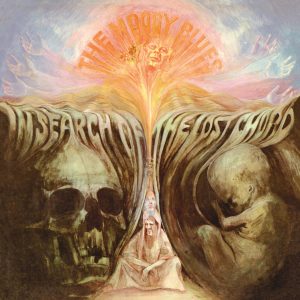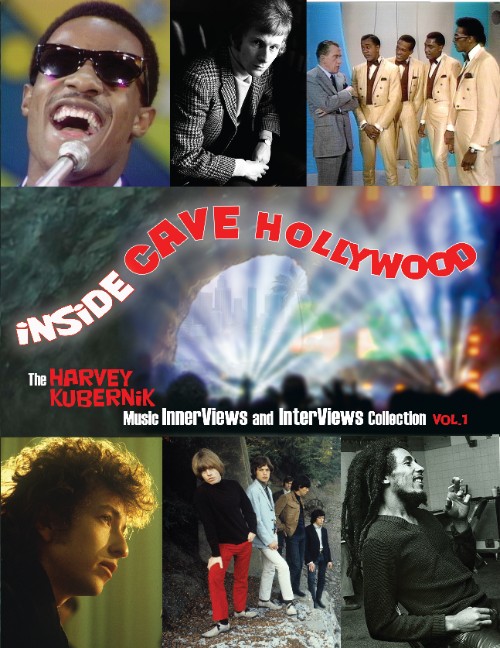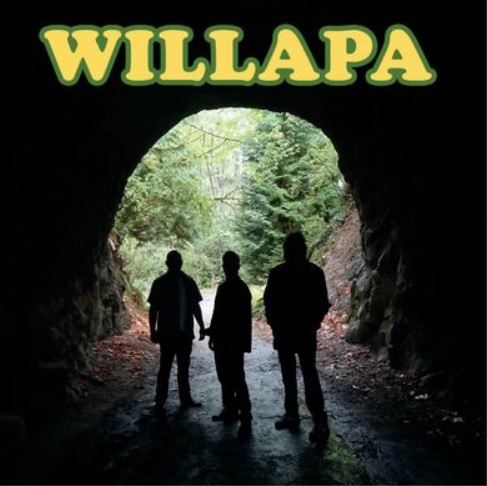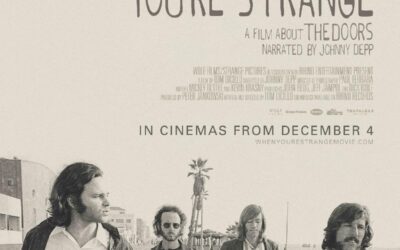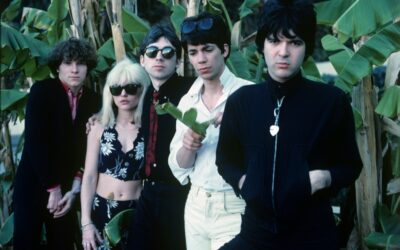Commemorative Releases Available In 3CD/2DVD Box Set, Deluxe and Standard Digital Collections, CD, and Vinyl LP Packages
By Harvey Kubernik c 2018
On November 2, Polydor/Republic/UMe released the 50th Anniversary Deluxe Edition of The Moody Blues’ classic third album, In Search of
the Lost Chord.
The deluxe format is a 3CD/2DVD box set, featuring the album’s remastered original stereo mix and new stereo mix, plus rare and unreleased tracks, including a never-before-heard mono version of Legend of a Mind. There are BBC Radio One John Peel Top Gear and Afternoon Pop Show sessions, as well as mono mixes of the related Deram single A and B sides.
DVD1 (Audio) contains In Search of the Lost Chord 96kHz/24-bit 5.1 surround mix, new stereo mix, and original stereo mix.
DVD2 (Video) comprises BBC TV Colour Me Pop: In Search of the Lost Chord (14th September 1968); Ce Soir On Danse: The Moody Blues – ORTF French TV (13th July 1968, previously unreleased) and Carte d’Or – ORTF French TV (29th October 1968, previously unreleased).
A 76-page book is also included, with extensive sleeve notes by compiler Mark Powell, plus a host of rare photos and memorabilia images.
Released in July 1968, In Search of the Lost Chord is regarded by many to be the group’s masterpiece. A concept album, concerning itself with the spiritual and philosophical concerns of the psychedelic era, the group eschewed the use of an orchestra, opting instead for the Mellotron (played by keyboardist Mike Pinder) and other exotic instrumentation, with which they experimented and played themselves, including flute, sitar, tabla and cello.
The Moody Blues were formed in Birmingham, England in 1964, with keyboardist Mike Pinder, flautist/vocalist Ray Thomas, drummer Graeme Edge, guitarist/vocalist Denny Laine, and bassist Clint Warwick.
The band first came to prominence playing rhythm, and blues, scoring a hit with a cover version of Bessie Banks’ “Go Now.”
Some early line-up changes followed, and a new line-up of Pinder, Thomas, Edge, guitarist Justin Hayward and bassist John Lodge re-emerged with the landmark 1967 LP, Days of Future Passed.
Co-founder and songwriter Mike Pinder departed The Moody Blues in 1978.
Another co-founder, songwriter Ray Thomas, who retired in 2002, passed away in January 2018.
Thomas wrote a slew of tunes for the Moody Blues, including “Legend of the Mind,” a nod to LSD guru Dr. Timothy Leary, “Dr. Livingstone, I Presume,” “Twilight Time,” along with “And the Tide Rushes In” and “Dear Diary.”
Thomas played harmonica on the Beatles’ “Fool on the Hill,” and along with Mike Pinder, sang backup vocals on the Beatles’ “I Am the Walrus”
Singer, songwriter and guitarist Justin Hayward was born in Swindon, Wiltshire, England on October 14, 1946.
Hayward was initially contacted by Mike Pinder, who had received Justin’s letter and demos discs from Eric Burdon of the Animals where Hayward answered an ad in the Melody Maker.
At the same time bassist/vocalist John Lodge replaced another founding member, Clint Warwick, joining another co-founder, drummer Graeme Edge.
Hayward penned “Fly Me High,” a Moody Blues’ Decca single in 1967, and then “Leave This Man Alone,” and collaborated with Pinder on his “Love And Beauty,” the first Moodies record to incorporate the Mellotron. This instrument is early version of sampling keyboards.
In ’67 the band recorded Days of Future Passed with the London Festival Orchestra conducted by Peter Knight.
The Moody Blues agreed to this Decca label initiated assignment in exchange for the removal of existing monies the group had not recouped with the company at the time.
It was Decca Records executive, A&R man, and record producer Hugh Mendl who had first championed their joint sound endeavor that was initially intended to showcase his new Deram progressive music record label, a Decca subsidiary. The pairing would showcase label’s new “Deramic Sound System,” expanded channel separation, for a combined rock version of Dvorak’s 9th Symphony.
Mendl served as executive producer of the project and later penned the liner notes to the first pressing and reprinted for all subsequent editions.
The group agreed to participate but with no interference or session visits from the Decca executives, plus the guarantee of producer Tony Clarke and engineer Derek Varnals on their creative audio team.
Once the deal was in motion, the band and Knight immediately abandoned the concept of reworking the Dvorak piece and then cut their own compositions with Knight orchestrating.
In late ’67 the LP was released and a European tour along with tireless promotional efforts by loyal company supporters in the U.K. and U.S. that pushed the disc right into the record charts
Hayward’s principal songwriting contributions, “Tuesday Afternoon” and “Nights in White Satin” further helped propel the LP over the two million sales mark, and considered one of the first and most influential symphonic rock albums.
Justin Hayward would emerge as the band’s driving force over the 1967-1974 period, also writing future hits and turntable favorites, “Lovely to See You,” “The Story in Your Eyes” and “Question.”
Throughout the 60s and 70s, the Moody Blues released a string of other concept albums including In Search of the Lost Chord, On the Threshold of a Dream, To Our Children’s Children’s Children, A Question of Balance, Every Good Boy Deserves Favour and Seventh Sojourn.
The Moody Blues were inducted into the Rock and Roll Hall of Fame in 2018. The group have been at the forefront of the UK’s classic rock music scene for decades and have continued to be a mainstay of concert stages, recording studios and the airwaves to the present day.
During their immensely successful career, they have sold, according to the band’s files, more than 70 million albums worldwide and they have been the recipients of numerous prestigious awards.
Justin Hayward has garnered a plethora of awards over the last few decades. In 2004, he was given the “Gold Badge” for lifetime achievement by the British Academy of Songwriters, Composers and Authors.
Harvey Kubernik and Justin Hayward 2012 interview
Q: Take me to the process of writing “Tuesday Afternoon” and then doing it for The Days Of Future Passed LP.
A: We had the idea for a stage show and then it really came from Mike who had written a song, ‘Dawn is a Feeling’ which I really loved. And then we got round to sort of thinking about this would be quite a good idea for a sort of thematic stage show about the day in the life of one guy. And I just sort of chose, ‘I’m gonna do the afternoon.’ And I had already done ‘Nights in White Satin’ written and recorded.
“So I went back to where my parents lived in the west country in England and with a guitar and went out that afternoon sat in the side of the field and smoked a joint and then came back with ‘Tuesday Afternoon.’ That was about it. I thought it was kind of a cheeky little song that wouldn’t really mean much.
Q: You debuted “Tuesday Afternoon” on a BBC radio session, before it was done with the band and the London Festival Orchestra conducted by Peter Knight.
A: It meant a lot to do the BBC after going professional. Totally. But I think it comes from us being a kind of reliable bread and butter live band for the BBC. We did a lot of Easy Beat and Saturday Club sessions for the Beeb. And they were very kind to us. But, you know, they got their monies worth out of us. They hardly paid us. (laughs).
Q: Did your early tunes like “Tuesday Afternoon” and ‘Nights in White Satin” even as you first wrote them and cut them with the band always have such inherent cinematic qualities?
A: I wish I could say I thought of it in those terms. But it was probably more to do with just the sort of, I hope this doesn’t sound too pretentious, I’m sure it is, the kind of search for enlightenment that young people do, and psychedelic experiences that I was going through. And it has more to do with that probably than thinking of it in a contrived way, you know, in a film sort of way. Interesting enough, Tony Clarke used to think like that all the time.
Q: What role did the Mellotron, even back then, play or impact your songwriting process and then recreating the Moodies sound on stage?
A: Well, Mike and the Mellotron made my songs work. That’s the simplest way I can put it. When he was playing piano it was difficult for me to try and find something that would be percussive on the piano and that would be interesting. And particularly because Mike had already played, you know, the greatest piano single ever, so that was going to be an impossible act to follow. But when he found the Mellotron suddenly my songs worked, you know.
When I played the other guys ‘Nights in White Satin’ they weren’t that impressed until Mike went on the Mellotron and then everyone was kind of interested. (laughs). Because it really started to hang together from the Mellotron.
“It’s just absolutely beautiful. And I would recommend it. The appeal of it was that we went our own way. The appeal was that we did think it was a small limited appeal album. And a lot of people who listen to it feel that way about it. ‘It’s just for me.’ It’s not a worldwide kind of thing. Not everybody liked it. It wasn’t universally liked. So I still like the fact that it was for an exclusive kind of audience. And only certain people would really appreciate or have the patience for it. And I think that’s it, really. That we went our own way and created our own identity with it.
Q: After Days Of Future Passed landed on the charts and sold, it was quite apparent being in this band was going to be your life. And the Moody Blues continued with another album. How do you even create a follow up to this work?
A: And the second album we were alone. But fortunately, Decca gave us Derek Varnels and Tony Clarke. And we had a load of songs, including ‘Legend Of a Mind,’ and maybe it might had been ‘Voices In The Sky,’ were done at the time of Days Of Future Passed. Our tracks don’t take up much time when you put them all together, like on Days of Future Passed.
“So we already had a couple of things, and out of that came this thing that Mike used to do this thing on the piano. And the second album came out of that. And we had a theme early on that we write to and that was it. And then it coincided with our first tour of America. And we decided, well we didn’t decide, it was that we were everybody’ support band. That was the way we worked. We would support anybody and go on tour opening up. We always figured opening up was the best place to be. We’d be back in the hotel by 9:00 pm. Luckily ‘In Search of The Lost Chord, and ‘Ride My See-Saw’ and ‘Voices in the Sky’ took off.
Q: I saw the band live a couple of times in the L.A. area in 1969 and 1970, once with Spirit, and On occasion there were some technical problems with the Mellotron on stage. These were primitive days in the technological recreation of studio sound. Were there situations where the Mellotron broke down or impeded a show?
A: Even at our 1970 Isle of Wight festival show that (director) Murray Lerner shot, there were real problems with the voltage. ‘Cause the voltage affected the mellotron. So if the voltage fluctuated so did the Mellotron’s pitch. That’s one. (laughs). There’s a couple of things like that where I’ve mixed live and you hear things that obviously the audience is never gonna hear.
“And then the other one was doing our very first gig for Bill Graham at the Fillmore East and then for the Mellotron to pack up in the first song. And for Mike to spend the first set with his head in the back of the Mellotron was devastating.
“I just remember the blues guy, John Mayall, who was also on Decca, and extremely pissed off that we were above him on the bill. (laughs). I just remember him looking across and seeing him in the wings laughing his head off at Mike. And he knew Mike well. And so bless him. Good old John is still around.
Q: I always enjoyed that on your albums there were bits of spoken word and narration integrated in some of the songs. Recitation and talk. Was that part of the process when you were preparing the projects or doing pre-production?
A: It wasn’t so much by design. It was Graeme wanted to contribute. He was a good lyric writer. He was good at spoken word. He was a poet. And we had to get it in there somehow. And he would often try and bring the whole album theme together with his spoken word stuff. And he did that very well. So that’s where that came from.
“Then also that album called The Zodiac Cosmic Sounds on Elektra Records. (incorporating moog synthesizer from Paul Beaver and narration by Cyrus Faryar). That really turned us on. And we have to give that album some credit for really influencing us.
Q: From your Question of Balance LP I used to spin a Mike Pinder song, “How Is It (We Are Here)” that followed your “Question.”
A: Oh yes!
Q: Are you even aware that decades ago, those songs chronicled the world of physical existence, and others, like your tune “Cities,” was a comment on ecology and planetary concerns. Akin to the Doors’ “When the Music’s Over.”
Some local FM radio stations used to couple the recordings together. The ecology theme was translating back to us in Hollywood and Laurel Canyon.
A: I was absolutely aware of that. I was a country boy and I never really, apart from a couple of times in my life for a few weeks, I never really, you know, lived in the city before. So I was very much in my mind. I love the English countryside. And London was a big kind of frightening place. But I knew it held the future. You had to be in London to get anything done.
Q: What is it like singing and performing songs that you initially wrote and recorded and now 45 or 50 years later it is you as an adult doing them? Is the song or the message the same or different?
I know you’ve embraced your back catalog, and active in re-mastering and income streams, but are these songs and the recordings now another experience for you?
A: Well, now that’s a good question. Because I think they are relevant today. There’s a naivety about them that I would not, and this is the same for all of us in the band, that I would not have the courage to write today. And it’s as simple as that. I’d be afraid of writing it or exposing something that would be to kind of criticism. So I’d play it a lot more safe now.
(Harvey Kubernik is the author of 15 books, including titles on Leonard Cohen and Neil Young. His 2017 volume, the acclaimed 1967 A Complete Rock History of the Summer of Love was published by Sterling/Barnes and Noble. Inside Cave Hollywood: The Harvey Kubernik Music InnerViews and InterViews Collection, Vol. 1 was published in December 2017, by Cave Hollywood. Kubernik’s The Doors Summer’s Gone was published by Other Cottage Industries in March 2018.
In November 2018, Sterling/Barnes and Noble published Harvey’s book, The Story of The Band From Pig Pink to The Last Waltz, written with brother Kenneth Kubernik.
Harvey Kubernik’s 1995 interview, Berry Gordy: A Conversation With Mr. Motown, that initially was published in 1995 in Goldmine and HITS magazines has just been licensed for inclusion in The Pop, Rock & Soul Reader edited by David Brackett to be published in 2019 by Oxford University Press.
This century Harvey penned the liner note booklets to the CD re-releases of Carole King’s Tapestry, Allen Ginsberg’s Kaddish, Elvis Presley The ’68 Comeback Special and The Ramones’ End of the Century.
In November of 2006, Harvey Kubernik was a featured speaker discussing audiotape preservation and archiving at special hearings called by The Library of Congress and held in Hollywood, California).

